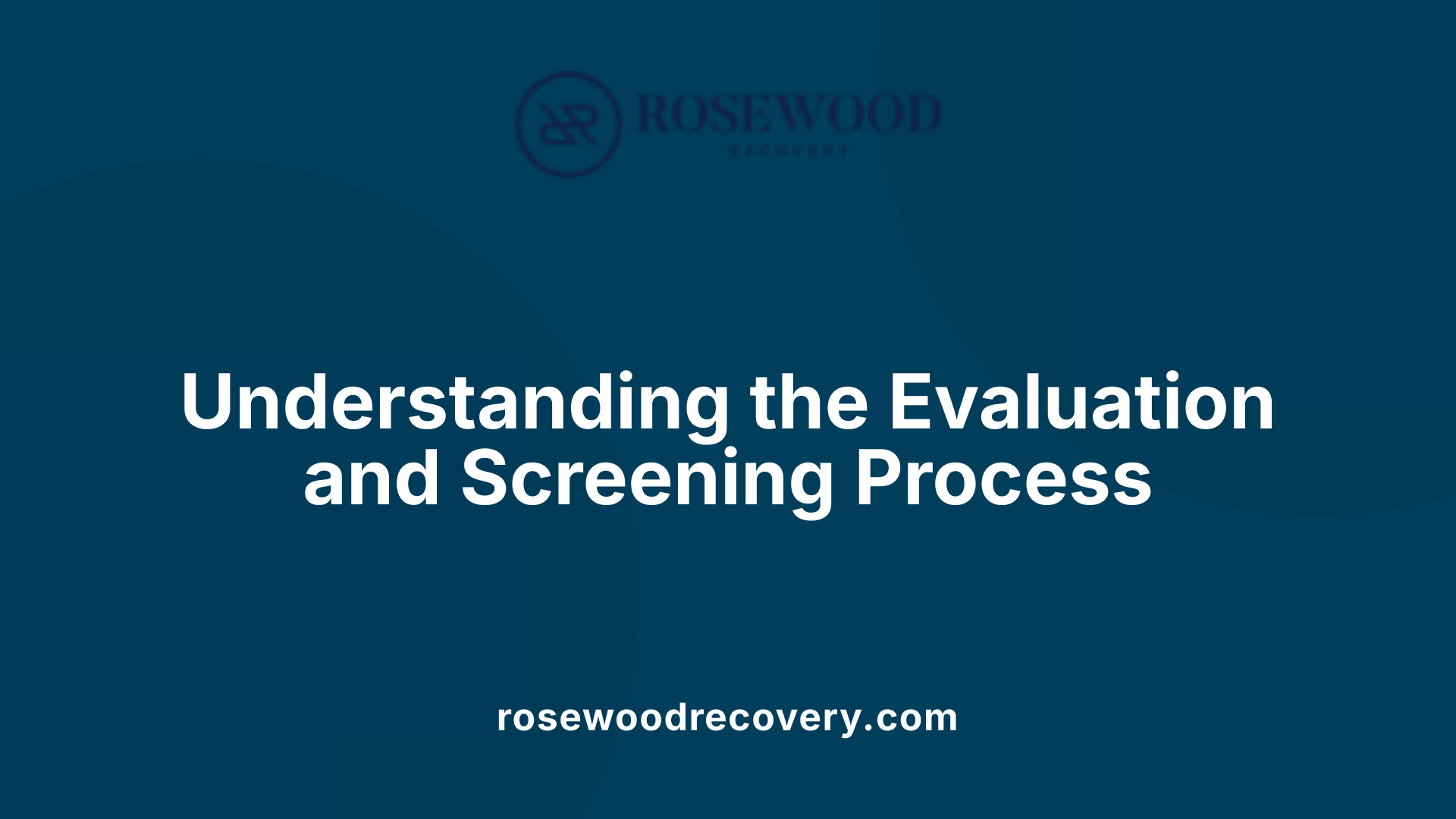Understanding the Intake Process in Outpatient Treatment
Starting outpatient treatment for substance use or mental health concerns is a pivotal step in recovery. The intake process is designed to gather essential information about the individual's health status, treatment needs, and support systems. This comprehensive assessment ensures that each person receives a personalized care plan tailored to their unique needs. Here, we explore what occurs during outpatient intake to demystify the process, highlight critical steps, and prepare individuals for a successful treatment journey.
The Purpose and Significance of the Intake Process
What is the purpose of the intake process in outpatient treatment programs?
The intake process in outpatient treatment is a critical first step that helps clinicians gather detailed information about the individual's overall health, mental health, and substance use history. Through clinical assessments, screenings, and sometimes drug tests, providers evaluate the person's current recovery status and identify any co-occurring conditions or support systems. This comprehensive gathering of data enables clinicians to determine the most suitable level of care—whether it be standard outpatient, Intensive Outpatient Program (IOP), or Partial Hospitalization Program (PHP).
The process also aims to develop a personalized treatment plan tailored to each individual's goals, circumstances, and needs. Such plans might include therapy, medication management, family involvement, and supportive services. Building rapport and establishing trust are integral during intake, fostering a therapeutic alliance that encourages ongoing engagement and commitment to recovery. Ultimately, the intake serves as the foundation for effective, targeted interventions that set the stage for successful long-term recovery.
The Multi-Step Outpatient Admission Journey

What are outpatient programs, and what do they typically involve?
Outpatient programs are treatment options designed to help individuals recover from substance use disorders while still living at home or in sober environments. These programs provide scheduled therapy sessions, combining individual and group counseling, behavioral therapies like cognitive behavioral therapy (CBT), psychoeducation, and case management. Typically, they involve at least 9 hours of therapy per week, allowing clients to continue working, attending school, and managing daily responsibilities.
These programs are suitable for individuals who do not require intensive supervision or detoxification. They may include medication management and crisis intervention support, ensuring comprehensive care without overnight stays at a facility. Outpatient services are positioned within the broader spectrum of addiction treatment, bridging inpatient care and less intensive outpatient supports.
The main goal of outpatient programs is to sustain recovery, reduce relapse risk, and encourage behavioral change. They offer ongoing support, life skill development, and relapse prevention strategies, enabling participants to build a healthy, sober lifestyle while maintaining their regular routines.
What steps are involved in the outpatient admission process?
The outpatient admission process is a structured journey that ensures personalized, effective care. It generally involves four key steps:
Initial Contact and Inquiry: The process begins when the individual or their family reach out to the treatment center via phone, online form, or email. This initial contact allows the facility to gather basic information and answer any preliminary questions.
Pre-Screening and Assessment: Next, the individual completes a pre-screening assessment. This step evaluates their physical health, mental health, substance use history, current medications, living situation, and insurance coverage. Staff or clinicians may perform questionnaires, interviews, and medical examinations, including drug tests, to develop a clear understanding of the person's needs.
Treatment Recommendation and Planning: Based on the assessment, a healthcare professional reviews the findings and recommends the most appropriate level of care, which could range from outpatient to more intensive options like PHP or inpatient treatment. During this stage, clinicians also discuss treatment goals, preferences, and any potential barriers.
Financial and Logistical Arrangements: The final step involves establishing a payment plan and organizing logistical details, such as schedules and transportation. Staff help explain available treatment options, clarify expectations, and ensure that the individual or family understands the process ahead.
Throughout these steps, a clinician or admissions navigator acts as a guide, explaining care levels, answering questions, and preparing the patient for a smooth transition into outpatient treatment.
Additional Considerations
The intake process at treatment centers often includes comprehensive clinical evaluations, safety assessments (including detox if needed), and the creation of personalized care plans. Patients are introduced to the facility through tours and orientation sessions, and they meet with counselors or therapists who will oversee their recovery journey.
During intake, individuals can discuss their therapy preferences, treatment goals, and concerns, helping clinicians tailor interventions like individual therapy, family involvement, medication management, and holistic therapies such as yoga or art therapy.
Overall, the outpatient admission journey is designed to be compassionate, thorough, and individualized, aiming to set the foundation for effective treatment and lasting recovery.
Initial Evaluation and Screening Procedures

What happens during a comprehensive health and substance use assessment?
The initial phase of outpatient intake begins with a thorough evaluation conducted by healthcare professionals. This assessment aims to understand the individual's physical health, mental health status, and history of substance use. During this process, the clinician gathers detailed information about the specific substances used, including types, frequency, and duration. They also review medical history, current medications, and any existing health conditions.
In addition, mental health aspects such as mood disorders, anxiety, trauma history, and other psychological factors are explored. This comprehensive view helps identify co-occurring mental health disorders that may require integrated treatment approaches. The assessment also considers social factors, including family dynamics, employment, legal issues, and support systems, which influence treatment success.
Screening tools and standardized questionnaires
To ensure accuracy and consistency, various screening instruments and questionnaires are utilized throughout the intake process. Commonly used tools include:
| Screening Tool | Purpose | Additional Details |
|---|---|---|
| Simple Screening Instrument | Quick assessment of substance use severity | Used for initial screening |
| Alcohol Dependence Scale | Measures severity of alcohol dependence | Guides treatment planning |
| Texas Christian University Drug Screen | Identifies substance use patterns | Helps tailor interventions |
| Addiction Severity Index | In-depth profile of addiction and related problems | Used for comprehensive biopsychosocial evaluation |
These tools facilitate early detection of substance use issues and co-occurring mental health disorders, informing treatment decisions.
Co-occurring mental health evaluation
Many individuals seeking outpatient treatment also face mental health challenges such as depression, anxiety, or trauma-related conditions. During intake, clinicians assess these areas through interviews and standardized mental health questionnaires. This evaluation helps determine if specialized mental health services are needed alongside addiction treatment.
Professionals may explore symptoms like mood swings, panic attacks, suicidal thoughts, or psychosis. Recognizing these issues early allows for an integrated approach combining therapy and medication management if appropriate. Addressing mental health needs alongside substance use provides a stronger foundation for sustained recovery.
Identification of treatment barriers
A crucial part of the intake involves identifying potential obstacles that could hinder treatment progress. These barriers include:
- Physical issues such as withdrawal symptoms or medical complications
- Psychiatric conditions like psychosis or severe depression
- Social factors, such as lack of transportation, unstable housing, or childcare responsibilities
- Substance intoxication or withdrawal at the time of intake
Recognizing these barriers enables the treatment team to develop effective strategies, such as coordinating detoxification protocols, arranging for social services, or modifying treatment schedules. Overcoming these challenges early improves adherence and outcomes.
Through comprehensive assessments, standardized tools, mental health evaluations, and barrier identification, outpatient facilities establish a personalized and effective treatment pathway. This initial step ensures that care is tailored to meet the individual's specific needs, setting a solid foundation for their recovery journey.
Questions During a Behavioral Health Intake

What questions are typically asked during a behavioral health intake appointment?
During a behavioral health intake, mental health professionals conduct a comprehensive assessment by asking a broad array of questions. They begin with inquiries about the primary concerns that led the individual to seek treatment, understanding the presenting issues and symptoms like anxiety, depression, or behavioral changes.
Clinicians will explore the person’s medical and mental health history, including past diagnoses, hospitalizations, medications, and any ongoing treatments. Substance use history is thoroughly examined, including types of substances used, frequency, duration, and the impact on daily functioning.
Questions about legal history, trauma, childhood background, family dynamics, social relationships, work or school performance, and support systems are also common. Clinicians ask about current living arrangements, employment status, and stressors that may influence mental health.
Understanding these aspects helps develop a detailed picture of the individual’s life context. The goal is to gather enough information to tailor a treatment plan that addresses specific needs and circumstances.
How does the intake process assist in planning treatment and setting goals?
The intake process plays a vital role in shaping an effective treatment path by giving clinicians a clear view of the client’s current mental health state and historical background. This detailed understanding allows professionals to identify the most pressing issues and areas requiring intervention.
During intake, clients are encouraged to share their treatment goals, whether to reduce symptoms, improve relationships, or develop coping skills. This collaborative discussion helps align therapeutic approaches with the individual’s personal ambitions and expectations.
Information gathered about symptoms, substance use, and life stressors informs the selection of appropriate therapies, medications, and support services. For instance, a person with trauma history may benefit from specialized trauma therapy, while someone with substance dependence might require medication-assisted treatment.
Setting clear, achievable goals during intake fosters motivation, provides direction for treatment, and allows for progress tracking. Overall, the intake process ensures that subsequent care is personalized, goal-oriented, and supportive of long-term recovery.
First Hours and Initial Meetings at Outpatient Facilities

What should I expect during the first hours and initial meetings at outpatient facilities?
When starting outpatient treatment, your first visit is an important step in the recovery process. Expect to spend approximately two to three hours with various healthcare professionals. It's recommended to arrive early, ideally at least 30 minutes before your scheduled appointment, to complete check-in procedures.
Bring necessary documentation such as your insurance card, medical records, and any relevant images, like radiology films, if applicable. Upon arrival, the staff will guide you through the check-in process and may offer a welcoming environment with comfortable waiting areas.
During this initial period, you'll undergo a comprehensive review of your medical history, including substance use patterns, previous treatments, and current health conditions. You might undergo a physical examination and discuss your symptoms, concerns, and personal treatment goals.
A treatment team, which could include medical doctors, nurses, mental health specialists, social workers, and support staff, will collaborate to develop your personalized care plan. This multidisciplinary approach ensures that your physical health, mental well-being, and social factors are all addressed.
To make the most of this initial visit, consider preparing questions, taking notes, and recording sessions if permitted. This helps you feel engaged in your care and clarifies any uncertainties about your upcoming treatment.
What does the first day at an outpatient program typically involve?
The first day at an outpatient program is designed to gently introduce you to the treatment environment and set the stage for recovery. It usually begins with an orientation session where you learn about the program's rules, confidentiality policies, and treatment structure.
You will meet the staff members, including therapists, counselors, and program coordinators. Often, a tour of the facility is provided to help you become familiar with the environment. This helps reduce anxiety and makes your visits more comfortable.
A critical part of the first day is the initial assessment, which includes completing paperwork on your medical history, substance use, mental health status, and social circumstances. This information allows your care team to tailor your treatment plan effectively.
During this time, you may also meet with your assigned therapist or counselor, who will discuss your upcoming schedule and set expectations. Establishing a rapport with your treatment team is vital for effective therapy and support.
The overall goal of your first day is to create a welcoming, supportive atmosphere that encourages openness and trust. This foundation helps motivate you to actively participate in your recovery journey.
More information about what happens during the first hours and initial meetings at outpatient treatment
Understanding the initial steps can help you feel more prepared and less anxious about treatment. Visiting outpatient facilities typically involves a thorough assessment by the care team, which lays the groundwork for your personalized treatment plan.
The process emphasizes open communication, as staff aim to understand your needs, concerns, and treatment goals. During intake, detailed questions about your substance use, medical conditions, mental health, and social support network are asked.
Your health history is gathered carefully, often using standardized screening tools such as the Addiction Severity Index or alcohol and drug dependence scales. This helps identify any co-occurring disorders or barriers to treatment.
Safety evaluations are also conducted, especially if withdrawal symptoms or medical issues are present. If necessary, detoxification might be part of the initial phase, supervised by medical professionals.
Throughout the initial meetings, the staff works to build trust, explain treatment options—such as individual therapy, group sessions, medication management, or holistic therapies—and answer any questions you may have.
A core focus during these early interactions is to ensure that your care plan aligns with your personal goals, lifestyle, and responsibilities. This personalized approach aims to support your long-term recovery.
In conclusion, early meetings are foundational for setting expectations, establishing rapport, and creating a safe, welcoming environment where recovery can begin effectively.
Preparing for a Successful First Day in Treatment

What should I do to prepare for the first day at outpatient treatment?
Getting ready for your first day at outpatient treatment is an important step toward your recovery journey. Proper preparation can help ease anxiety and set a positive tone for your ongoing process.
Start by packing essential items that will support you during your visit. Bring a notebook and pen to jot down notes or questions, along with your identification and any prescribed medications. Including comfort items such as a sweatshirt, stress ball, or a small personal item can provide reassurance during your stay.
Arriving early is advisable. This allows ample time for check-in procedures, completing paperwork, and settling in without feeling rushed. Many programs offer an orientation session, which can be useful to understand what to expect.
Mentally, it’s beneficial to focus on your motivation for seeking help. Reflect on your goals, reasons for recovery, and what you hope to achieve. Maintaining a positive and open-minded attitude can boost your engagement and willingness to participate.
Setting realistic expectations is crucial. Understand that recovery is a process that involves gradual progress. Be patient with yourself, and recognize that the first day is just the beginning.
It’s also helpful to communicate with supportive friends or family members before your first day, if you feel comfortable. Sharing your intentions and seeking encouragement can bolster your confidence.
In summary, being well-prepared by organizing your essentials, arriving early, and fostering a motivated, positive outlook can greatly enhance your initial outpatient treatment experience. Remember, this first step is a vital milestone, and your proactive mindset can make a significant difference.
Starting Your Recovery Journey with Confidence
The outpatient intake process is a critical gateway to personalized, effective addiction and mental health treatment. It involves multiple steps—from initial contact and thorough assessments to treatment planning and logistical arrangements—all designed to ensure that each individual receives care tailored to their unique needs. Understanding what to expect during intake can alleviate anxiety, foster trust, and enhance engagement. As you embark on this path, remember that each step is meant to support your recovery, build resilience, and ultimately lead to a healthier, more fulfilling life. With professional guidance and your commitment, the outpatient treatment journey can become a powerful foundation for lasting change.
References
- What Happens During Outpatient Intake Process At Treatment Centers
- Outpatient, PHP, and IOP Rehab Admissions Intake Process
- What to Expect in Outpatient Rehab - Recovery At The Crossroads
- What to Expect on Your First Day of Rehab
- What Happens During An Intensive Outpatient Program (IOP)?
- What to Expect During Intake | Behavioral Health
- What to Expect in Outpatient Rehab - Insight Recovery
- What to Expect Your First 30 Days in an Intensive Outpatient Program




